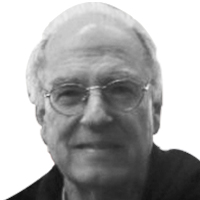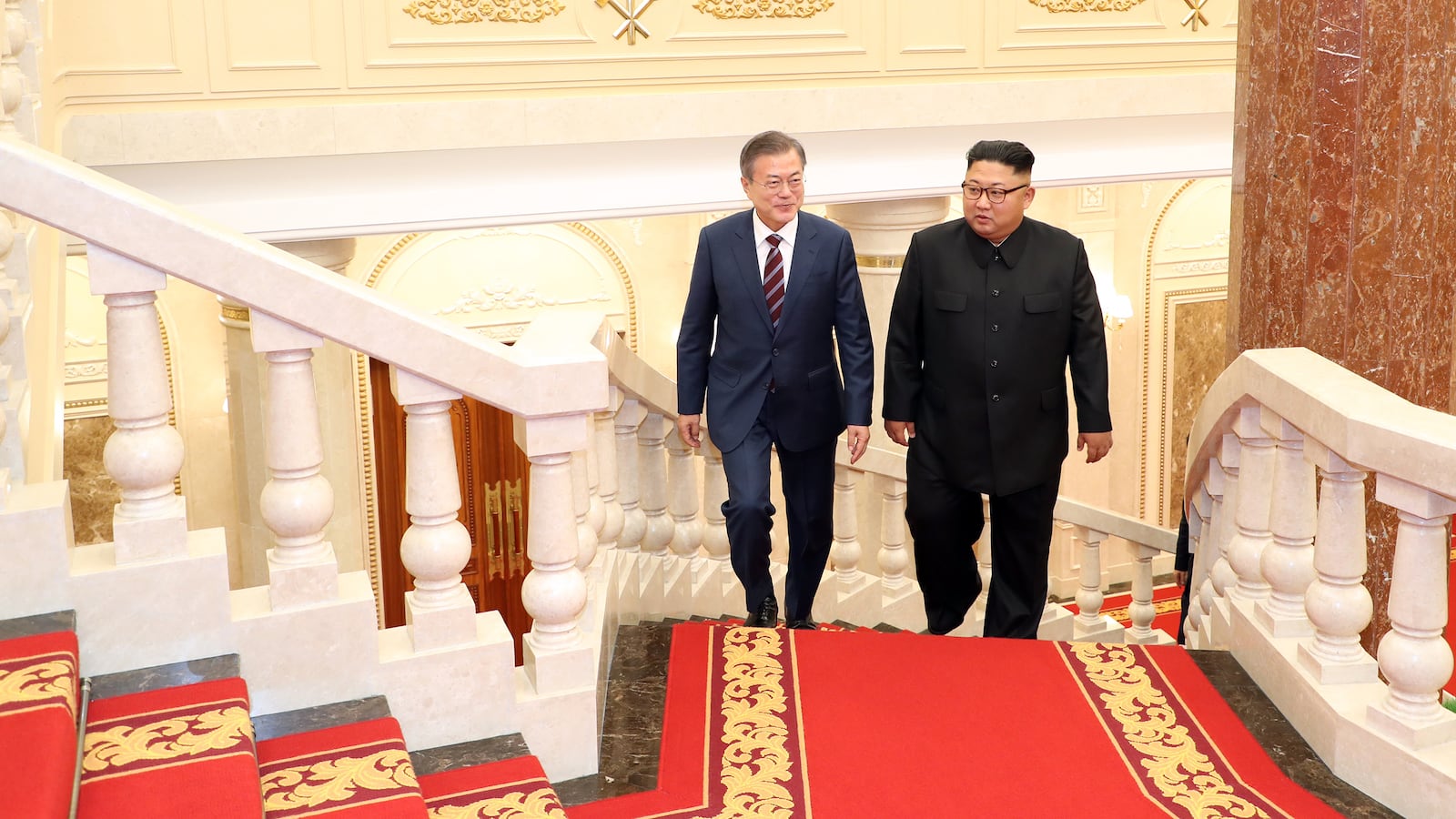This report was updated with latest developments as of 11:55 a.m. EDT, September 19, 2018
Donald Trump has done it again. He’s confusing what he would dearly like North Korea’s Kim Jong Un to do with what has actually been promised, in this case at the summit in Pyongyang between Kim and South Korea’s President Moon Jae-in.
Trump fired off a tweet minutes after the North and South Korean leaders had signed their final statement on Wednesday, triumphantly declaring that Kim had “agreed to allow Nuclear inspections, subject to final negotiations….”
Sorry, but what Kim and Moon really said was that the North had “expressed its willingness to continue taking additional steps, such as the permanent shutdown of the Yongbyon nuclear facility” – the site 60 miles north of Pyongyang where a five-megawatt reactor producing plutonium for warheads has made anywhere from 20 to 60 of them – “should the United States take corresponding measures….” (our italics).
Trump’s ecstacy over “inspections” apparently reflected Kim’s pledge for inspectors to be able to watch the dismantling of a facility for testing the engines of long-range missiles at the village of Tongchang-ri near the Chinese border. The president said Kim had agreed to do all that “in the presence of international experts” but seemed blissfully unaware that Kim and Moon have been saying all along the U.S. needs to take “steps” in tandem with denuclearization by the North.
“The devil is in the details,” as Mark Fitzpatrick of the International Institute for Strategic Studies put it in an email. The North’s idea of “corresponding measures” presumably means U.S. acquiescence to a “peace declaration” that would be the precursor to a treaty entailing a sharp reduction in the number of U.S. troops in Korea, already down to 28,500, and disbandment of the United Nations Command under which the U.S., South Korea, plus contingents from 16 other countries, fought the Korean War.
Kim made clear he’s sticking to his guns, that is, his nukes and missiles, on the second day of a three-day mission that ended with the South Korean president and his entourage of about 200 ministers, aides and journalists, not to mention the chieftains of a dozen of the South’s great industrial empires, watching “mass games” enacted by thousands of performers in a display of North Korean economic and military prowess.
The entire spectacle, from the time Moon and wife alighted Tuesday at Pyongyang’s gleaming new airport, to be greeted with effusive hugs and smiles by Kim and wife against a backdrop of goose-stepping soldiers and cheering throngs, did not inspire confidence that a solid peace as Trump has promised is close at hand.
One thing was perfectly clear: in the third meeting between Moon and Kim, their first in the North Korean capital, Kim was not about to give up his precious nukes and the missiles for carrying them to distant targets, including the United States.
He’s not giving up, though, on Trump himself, who has had nothing but kind words to say about Kim since June 12 at the Singapore summit where they both signed off on a pledge to bring about “complete denuclearization.”
The South Korean pool report quoted Kim saying that thanks to the Singapore summit, “regional conditions stabilized and a more advanced outcome is expected.” Which is pretty much what the Trump administration keeps telling the world. And Moon had “helped find the start of the historic North Korea-U.S. talks,” Kim said.
Since the first Moon meeting with Kim was in the truce village of Panmunjom on the South side of the North-South line, and this was treated as momentous, the trip to the North Korean capital might have seemed extraordinary. But it was not.
In fact, the show in Pyongyang was a reminder that others have been there before. Kim’s father, Kim Jong Il, received the South Korean president, Kim Dae-jung, in June 2000 and then Kim DAE-jung’s successor, Roh Moo Hyun, in October 2007, amid similar pomp and circumstance.
They’re all dead now, but Moon, who attended the second summit as Roh’s chief of staff, was clearly overjoyed to be leading the delegation, even if it was a reminder of lost dreams and gnawing hostility.
The South Korean leader could only hope that “for Chuseok,” the South Korean thanksgiving holiday coming up on Monday, the summit “produces abundant results as a gift to the 80 million people of this nation.” Most importantly, he said before taking off from Seoul, his “North Korea trip would have great meaning if it could lead to the resumption of North Korea-U.S. dialogue.” While “the entire world is also watching,” he prayed “we will show the fruits of peace and prosperity to all people in the world.”
Right.
If there’s one thing that Trump’s closest aides and many South Koreans skeptical of Moon’s overtures to Kim fear, it’s the specter of Trump exchanging more love notes with Kim and then meeting him yet again for a summit at which he would be sure to be suckered into still more concessions.
At the least, the fear is that Trump may join Kim in signing a “peace declaration” in place of the armistice that ended the Korean War more than 65 years ago. That’s the interpretation from Trump’s response to what the White House has called “a very warm, very positive letter” from Kim earlier this month that exudes the North Korean’s confidence in his ability to win over the U.S. president after failing with Secretary of State Mike Pompeo.
Evans Revere, a former senior U.S. diplomat who specializes in North Korea, suspects Trump already indicated at the Singapore summit he’d be amenable to a “peace declaration,” but held back on endorsing it on advice from Pompeo and John Bolton, his hawkish national security adviser.
“Now the North Koreans are trying to go over Pompeo and Bolton’s head,” says Revere. “I’m under the impression the president has already agreed to a peace declaration.” Certainly, “the North Koreans are convinced.” Kim definitely has Moon on his side. Moon is calling for “complete denuclearization,” to be sure, but may also endorse North Korea’s calls for a “step-by-step” process in which the U.S. makes significant concessions.
Trump impetuously cancelled joint exercises with South Korea’s forces that were scheduled for August, although he has maintained sanctions, which North Korea insists must be lifted.
Trump has said that sanctions have to remain in place until North Korea shows signs of getting rid of its nuclear stockpile and dismantling the facilities for making them, but he’s also made clear he will follow Moon’s lead in deciding what to do next.
Kim showed his eagerness to emphasize economic development rather than military power in a parade in Pyongyang on September 9 marking the 70th anniversary of the founding of the Democratic People’s Republic of Korea, a.k.a. North Korea, at which none of the long-range missiles capable of firing nuclear warheads as far as the U.S. was on display.“Kim purposely left out his biggest missiles,” says Fitzpatrick, of the IISS. "It was a calculated move on his part.” That decision, he said, “does reinforce Moon’s strategy–and hopes that Trump can be brought along.”
North Korean analysts believe Kim, besides aiming to bring Trump into line, also wanted to demonstrate his peaceful intentions to China’s President Xi Jinping, on whom the North depends for almost all its oil and many other necessities for survival. China still makes a show of enforcing U.N. sanctions but countenances numerous violations, including trade by private entrepreneurs.
“For the time being, Kim focuses on feeding his people,” says Shim Jae-hoon, an analyst for Yale Global. “He has to secure help from China and running a jingoistic theme would be hardly helpful.”
Once Kim gets a peace declaration his “next priority is to get the sanctions lifted so that he can sell more coal and minerals to buy food,” said Shim. “He also needs more investment for his armament industries that can sell to Africa and Middle East. The fact that he insists on the strategy of phased and synchronous disarmament means he will never give up nukes.”Victor Cha, who served as Asian expert on the national security council during the presidency of George W. Bush, agrees “downplaying of the ICBMs was a nod to China more than anything else. “
Kim, says Cha, did not want “to embarrass” Li Zhanshu, third-ranking official on the politburo of the Chinese Communist Party, who attended the 70th anniversary celebrations.
Cha still believes, however, it would be “hard to get a declaration deal.” There was, he says, “a lot of resistance to it” in Washington. At the least, he said, the U.S. should insist on “some sort of conventional arms reduction as part of a peace declaration,” notably pullback of North Korea’s thousands of artillery pieces from above the demilitarized zone that has divided North from South since the Korean War.
To the dismay of those around him, however, Trump continues to evince no such qualms, and still seems thrilled by Kim’s show of forbearance. “Thank you To Chairman Kim,” he exulted in a tweet after Kim wrote a letter requesting a second summit. “We will both prove everyone wrong! There is nothing like good dialogue from two people that like each other! Much better than before I took office.”
Trump’s joy over “a big and very positive statement from North Korea” confirmed an earlier tweet in which he had said “Thank you to Chairman Kim” for having proclaimed “‘unwavering faith in President Trump’.” Indeed, Trump tweeted, “We will get it done together!”
If Trump and Kim do meet again it would be against much of the advice given Trump by Bolton, Pompeo, Defense Secretary Jim Mattis, and Chief of Staff John Kelly. Pompeo got nowhere in his third visit to Pyongyang in July at which Kim Yong Chol, vice chairman of the ruling Workers’ Party under “Chairman” Kim, insisting Trump had supported a peace declaration, reportedly waving a mobile phone, advising Pompeo to call Trump if he did not believe him.
The secretary was due to make a fourth visit to Pyongyang, but Trump canceled the plan after Kim Yong Chol, not budging, messaged that North Korea would not act on denuclearization until the U.S. had made concessions that those around Trump oppose. Moon will be sure to present a much more upbeat view when he sees Trump in the U.S. next Monday, briefing him on the summit and high hopes for breaking the impasse with the U.S. over denuclearization.
Bolton has suggested that Kim has backed away from earlier assurances that he could dump his nuclear program in two years. “We’re still waiting for them,” he said in a speech.
Bolton’s hard line appeared at variance with that of his boss when he said Trump “can’t make the North Koreans walk through the door he’s holding open” though “the possibility of another meeting between the two presidents exists.”
Revere believes Bolton “must be really troubled” by Trump “leaning in the direction” of a peace declaration. Forget about U.S.-South Korea war games. Next: a peace treaty calling for withdrawal of U.S. forces. Trump’s staff members “are cautioning him,” said Revere, “but he doesn’t listen to them.”





